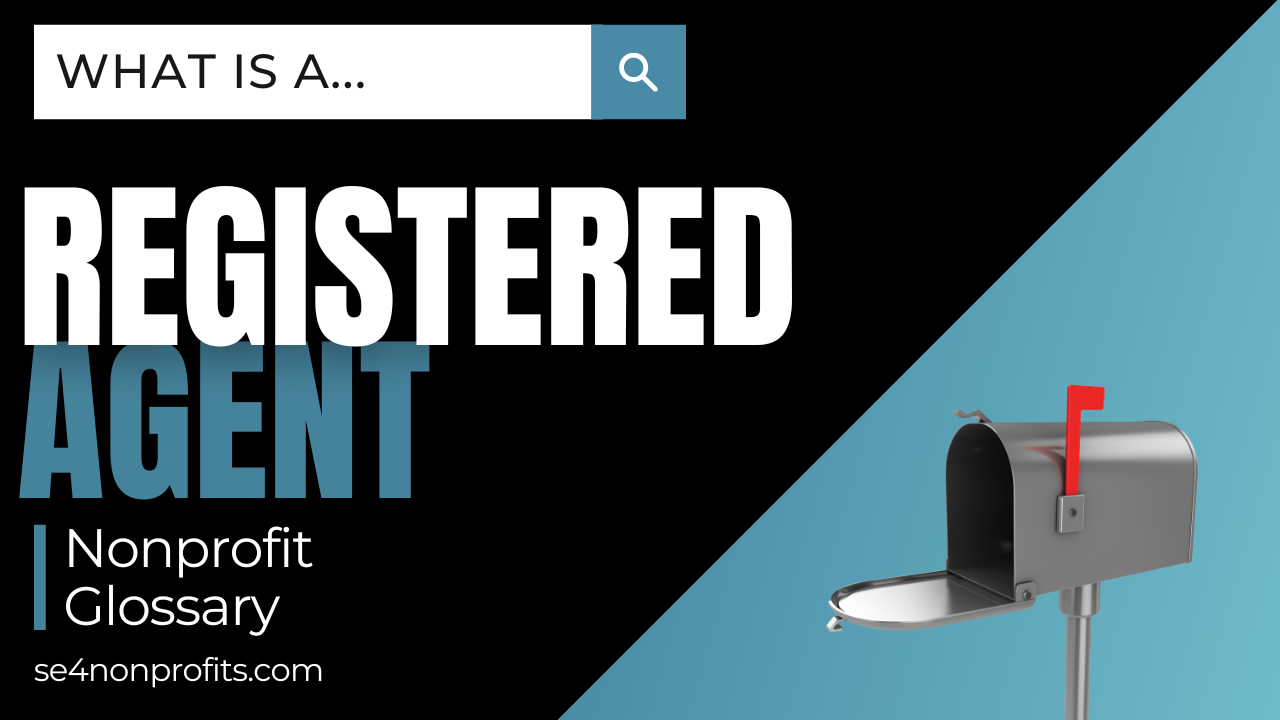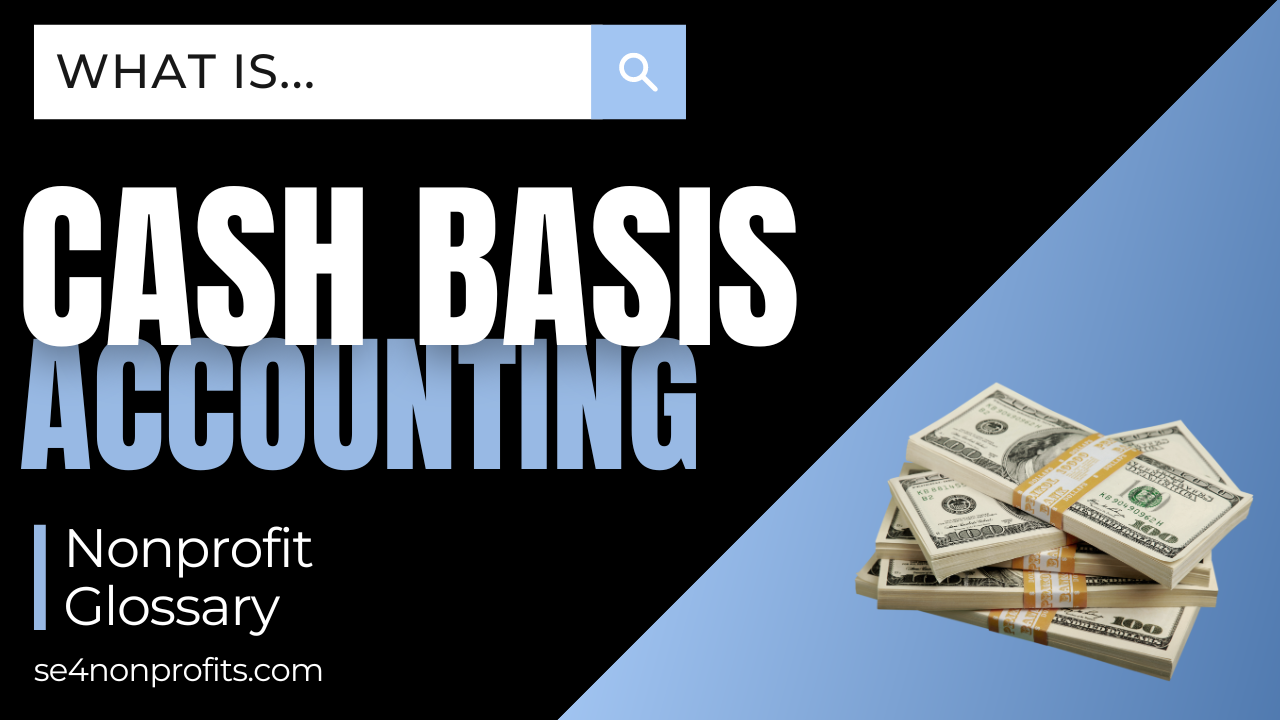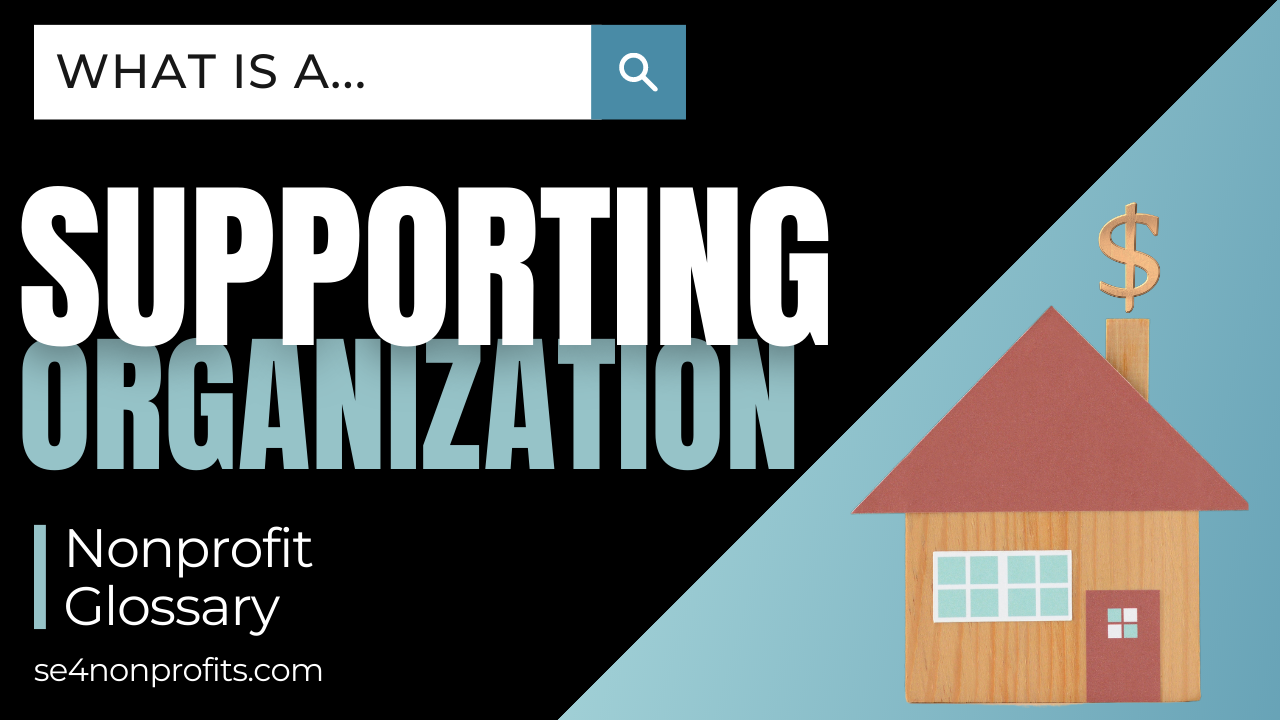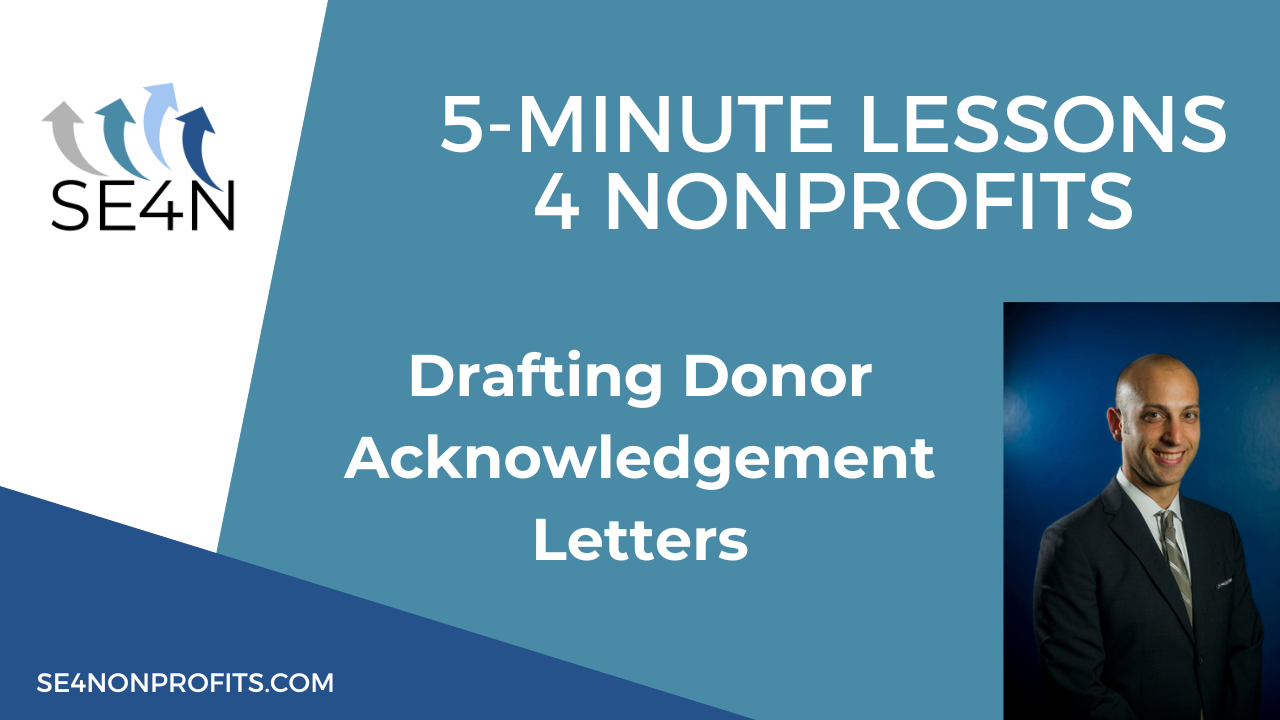
Blog.
Most Recent Posts

Q&A #154 – Are nonprofits required to have a document retention and destruction policy?
Sections 802 and 1102 of the Sarbanes-Oxley Act generally prohibit all persons, including nonprofit organizations, from destroying, falsifying, or otherwise modifying records to obstruct a federal proceeding or investigation. There is no specific requirement under federal law to have a document retention and destruction policy (sometimes called a record retention policy), but having one is a recommended best practice to prevent violations of this law and to demonstrate the organization’s commitment to transparency and accountability.

VIDEO: What is a Registered Agent? | Nonprofit Glossary
SE4N's Benjamin Takis provides a short summary of what a “registered agent” is, why state law requires nonprofit organizations to name a registered agent if the organization is incorporated in the state or doing business in the state, and who can serve as a registered agent.

Budgeting for Nonprofit Organizations and Why It’s Important to Start with Revenue and Support
Assembling a budget for a nonprofit organization often feels like an endeavor that requires more artistic methods than scientific computations. This is especially true when it comes to budgeting for revenue and support, which is usually hard to predict with accuracy. To help balance the art (intuition) with the science (analysis) of budget building, consider using a “funding-first” approach.

VIDEO: Applying the Segregation of Duties Principle | 5-Minute Lessons 4 Nonprofits
SE4N's A. Michael Gellman provides a short lesson on the importance of the segregation of duties (SOD) principle to nonprofit organizations, explaining how SOD is crucial not just for its standard checks and balances role, but also to help ensure that a transaction or process is a good use of resources, aligns with the mission, and enhances sustainability.

Q&A #153 – Are nonprofits required to have a whistleblower policy?
Section 1107 of the Sarbanes-Oxley Act prohibits all persons, including nonprofit organizations, from knowingly retaliating against certain whistleblowers. There is no specific requirement under federal law to have a whistleblower policy, but having one is a strongly recommended best practice to prevent violations of this law and to demonstrate the organization’s commitment to transparency and accountability.

VIDEO: What is Cash Basis Accounting? | Nonprofit Glossary
SE4N's A. Michael Gellman provides a short summary of the definition of cash basis accounting, its pros and cons, what types of nonprofit organization's typically use cash basis accounting, and when it may be time to think about switching to accrual basis.

The Importance of Budgets to Nonprofit Organizations
The word “budget” has almost universal recognition. Budgets have a very broad spectrum of usage and applicability beyond just nonprofit organizations, ranging from large entities (governments, Fortune 500 companies, professional sport teams) to small businesses, individual entrepreneurs, and even smaller applications such as families juggling home budgets and providing their children with early exposure to budgets through managing allowances.

Q&A #152 – What happens if a 501(c)(3) public charity exceeds the 501(h) lobbying limits?
501(c)(3) public charities are permitted to engage in “lobbying” up to certain limits. Organizations that make the “501(h) election” are subject to a more concrete set of limits based solely on expenditures made by the organization for lobbying purposes. If an organization exceeds these limits in any one tax year it will have to pay a 25% tax on the excess. A 501(h)-electing organization’s tax-exempt status will not be revoked unless its lobbying expenditures exceed 150% of the limits over a 4-year period.

VIDEO: What is a Supporting Organization? | Nonprofit Glossary
SE4N's Benjamin Takis provides a short summary of what 501(c)(3) “supporting organization” status means, how it relates to a nonprofit organization's public charity status under Form 990, Schedule A, and some of the key requirements applicable to supporting organizations.
![How Intermediate Cash Fund Pools Support Long-Term Investment Portfolios [SUBSCRIBERS-ONLY]](https://images.squarespace-cdn.com/content/v1/5e6ccadfb4659c1d51df14d5/1679405926502-PJHQWA1RBYIN3LWQEPOZ/reservoir-ge08373ff9_1920.jpg)
How Intermediate Cash Fund Pools Support Long-Term Investment Portfolios [SUBSCRIBERS-ONLY]
Nonprofit organizations should expand their cash management policies and procedures to include provisions for establishing and maintaining intermediate cash fund pools. This will not only enhance protection and management of operating (short-term) cash funds, but also act as a conservative buffer for long-term investment strategies, allocation targets, and portfolio risk management.

Q&A #151 – Who should nonprofits name as their principal officer at the top of the Form 990?
The Form 990 instructions state that for purposes of Item F at the heading of the Form 990, the “principal officer” is the person who “regardless of title, has ultimate responsibility for implementing the decisions of the organization's governing body, or for supervising the management, administration, or operation of the organization.” Application of this definition will vary depending on the organization, and this will not necessarily be the same officer who signs the Form 990 at the bottom of page 1.

VIDEO: Drafting Donor Acknowledgment Letters | 5-Minute Lessons 4 Nonprofits
SE4N's Benjamin Takis provides a short lesson on what to include in donor acknowledgment letters, what NOT to include, how to handle quid pro quo contributions, and more.
![How to Make Your Nonprofit Audit Committee More Impactful [SUBSCRIBERS-ONLY]](https://images.squarespace-cdn.com/content/v1/5e6ccadfb4659c1d51df14d5/1677020091627-XTQN5HH1TSD9V623Z7IZ/ran-berkovich-kSLNVacFehs-unsplash.jpg)
How to Make Your Nonprofit Audit Committee More Impactful [SUBSCRIBERS-ONLY]
Audit committees for nonprofit organizations are charged with filling a very important and broad fiscal and financial accountability and governance oversight role. Most nonprofit audit committees center their attention on the back-end of the annual financial statement audit process when they receive draft auditor reports. While this is an important function, audit committees can be more impactful if they shift more of their focus to the front-end of the annual audit process and expand their internal control and business practices oversight roles.

Q&A #150 – Can a nonprofit change its mission without IRS approval?
A 501(c)(3) public charity is generally permitted to change its mission and purpose and undertake new program areas that were not described in its Form 1023 application so long as these changes are consistent with 501(c)(3) status and properly disclosed in the organization’s Form 990. Advance IRS approval is not required, although significant changes in mission, purpose, and programs can affect an organization’s ability to rely on the IRS determination letter approving 501(c)(3) status.

Q&A #149 – Can a nonprofit use a DBA or trade name?
Like any other business or entity, nonprofit organizations are permitted to conduct their activities under a “trade name” (often referred to as a fictitious name, “doing business as,” or “DBA”) so long as the name is properly registered in the relevant states and reported on the Form 990, charitable solicitation registrations, and other required filings, and the name is available to use without infringing on the trademark rights of others.